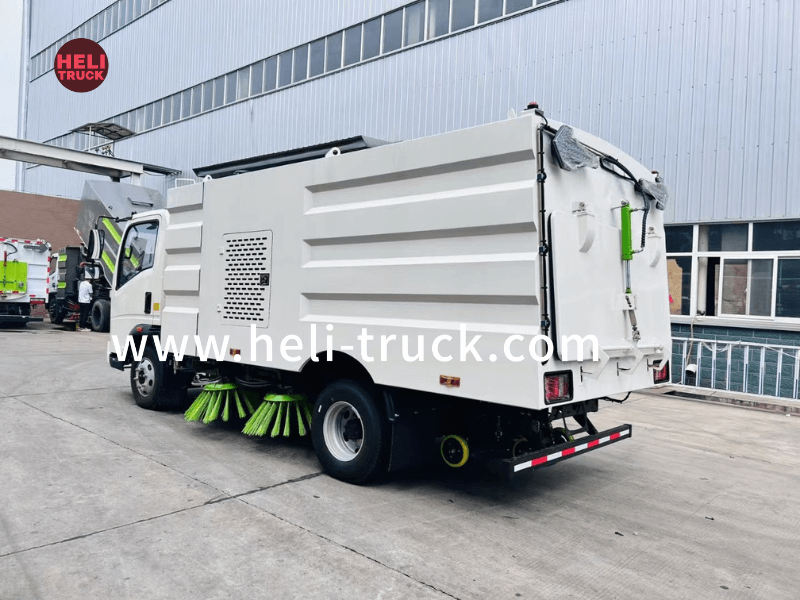Streamlining Waste Management on Construction Sites with Garbage Compactor Trucks

Introduction
Construction sites are bustling hubs of activity where various materials are used, processes take place, and waste is generated. Managing waste effectively on construction sites is crucial not only for environmental sustainability but also for maintaining a safe and organized work environment. One of the key tools that have revolutionized waste management on construction sites is the garbage compactor truck. These specialized vehicles are designed to efficiently collect, compact, and transport various types of waste, helping construction companies streamline their waste management processes and reduce their environmental impact. In this article, we will delve into the world of garbage compactor trucks for construction sites, exploring their features, benefits, and best practices for maximizing their efficiency.
Understanding Garbage Compactor Trucks
Garbage compactor trucks, also known as waste compactors or trash compactors, are specialized vehicles equipped with mechanisms for collecting and compacting waste materials. These trucks come in various sizes and configurations to suit different types of waste and operational needs. In the context of construction sites, garbage compactor trucks are typically used to collect construction debris, demolition waste, packaging materials, and other types of waste generated during the construction process.
Key Features of Garbage Compactor Truck s for Construction Sites
1. Compaction Mechanism: The primary function of a garbage compactor truck is to compact waste materials to maximize the truck's load-carrying capacity. These trucks are equipped with hydraulic compactors that compress waste into a smaller volume, allowing for more efficient collection and transportation.
2. Storage Capacity: Garbage compactor trucks come in various sizes, ranging from small units suitable for compact construction sites to large trucks capable of handling significant volumes of waste. The storage capacity of a garbage compactor truck is an essential consideration based on the amount and type of waste generated on the construction site.
3. Loading Mechanism: Garbage compactor trucks are designed with easy-to-use loading mechanisms that allow workers to deposit waste materials into the truck's storage compartment quickly. Some trucks feature rear-loading mechanisms, while others may have side-loading capabilities depending on the specific requirements of the construction site.
4. Durability and Safety Features: Construction sites can be harsh environments, and garbage compactor trucks are built to withstand rugged conditions. These trucks are constructed with durable materials and equipped with safety features to ensure the protection of workers and efficient operation in challenging conditions.
Benefits of Using Garbage Compactor Trucks on Construction Sites
1. Increased Efficiency: Garbage compactor trucks streamline waste collection and transportation processes on construction sites, reducing the time and labor required for waste management activities. By compacting waste materials, these trucks can make fewer trips to disposal sites, saving time and fuel costs.
2. Enhanced Safety: Proper waste management is essential for maintaining a safe work environment on construction sites. Garbage compactor trucks help reduce the risk of accidents and injuries associated with waste handling by providing a centralized and efficient waste collection solution.

3. Environmental Sustainability: Construction activities can have a significant impact on the environment, with waste generation being a primary concern. Garbage compactor trucks help construction companies minimize their environmental footprint by reducing the volume of waste sent to landfills and promoting recycling and proper disposal practices.
4. Cost Savings: By optimizing waste management processes, garbage compactor trucks can help construction companies save money on waste disposal fees, labor costs, and vehicle maintenance. These trucks offer a cost-effective solution for handling waste on construction sites, leading to long-term financial benefits.
Best Practices for Using Garbage Compactor Trucks on Construction Sites
1. Regular Maintenance: To ensure optimal performance and longevity of garbage compactor trucks, regular maintenance and servicing are essential. Construction companies should adhere to manufacturer guidelines for maintenance schedules and address any issues promptly to prevent downtime and costly repairs.
2. Proper Training: Operating a garbage compactor truck requires specialized skills and training. Construction site personnel responsible for using these trucks should receive proper training on vehicle operation, safety protocols, and waste handling practices to ensure efficient and safe operation.
3. Waste Segregation: Implementing a waste segregation system on construction sites can help maximize the efficiency of garbage compactor trucks. By separating recyclable materials, hazardous waste, and general waste at the source, construction companies can optimize waste collection and disposal processes.
4. Monitoring and Reporting: Keeping track of waste generation, collection, and disposal data is crucial for evaluating the performance of garbage compactor trucks on construction sites. Construction companies should implement monitoring systems and reporting mechanisms to track waste metrics and identify areas for improvement.
Conclusion
Garbage compactor trucks play a vital role in modern construction site waste management practices by providing a convenient and efficient solution for collecting and transporting waste materials. These specialized vehicles offer a range of benefits, including increased efficiency, enhanced safety, environmental sustainability, and cost savings. By following best practices such as regular maintenance, proper training, waste segregation, and monitoring, construction companies can maximize the effectiveness of garbage compactor trucks on their sites. Incorporating garbage compactor trucks into waste management strategies can help construction companies achieve their sustainability goals, improve operational efficiency, and create a safer work environment for their workers.
